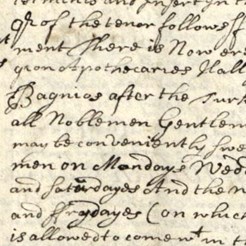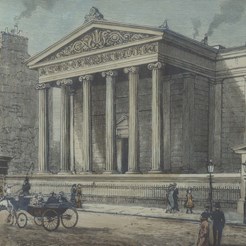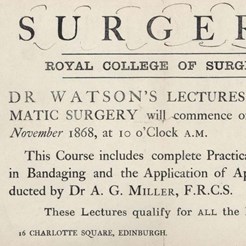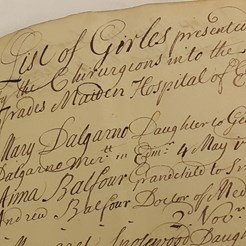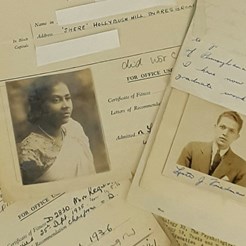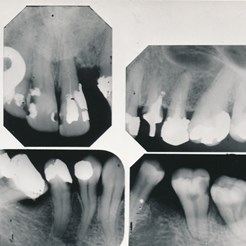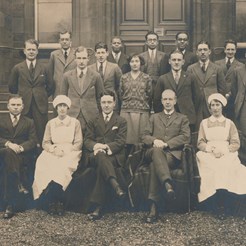The Wellcome Trust have recently introduced a Research Bursaries scheme to support researchers wishing to work on library or archive collections which have been catalogued and preserved through a Wellcome Trust Research Resources Grant. The Library and Archive at the Royal College of Surgeons of Edinburgh (RCSEd) is therefore inviting academic researchers, conservators, artists, performers, broadcasters, writers and public engagement practitioners to explore and use our collections, many of which remain unexplored. Our historical collections covering anatomy, surgery, medicine and pathology represent a unique resource dating from the early 16th century. The Research Bursaries are for small and medium-scale research projects (they need not be historically grounded) with support available in the range of £5,000-£25,000. You can see details of the funding stream, including applicant eligibility, here The Royal College of Surgeons of Edinburgh is one of the oldest surgical corporations in the world. Its story begins in the late 1400s when the roles of surgeons and barbers, both requiring sharp instruments to practise their trade, were indistinctly defined as regards such tasks as bloodletting, lancing, shaving, bandaging and treating wounds in battle. From its formal foundation in 1505, the Incorporation of Surgeons and Barbers, now (RCSEd), has dedicated itself to promoting the highest standards in surgical education, training and clinical practice. The archives have much to offer those who wish to research the educational activities and culture of a craft guild as it has developed over 500 years. Our recent Wellcome Trust award has enabled us to make five major collections more accessible to researchers, which you can read about here. The five collections falling into the category eligible for a Wellcome Trust Research Bursary are summarised below.
1. RCSEd Institutional Archive (1504 to date)
Spanning 500 years, the RCSEd Institutional Archive is extensive and has now been catalogued. It will shortly be available on our website. This collection is particularly rich in manuscripts relating to the development of medical professions in Edinburgh and the unique contributions made to surgical education and practice. From the earlier period there is a wealth of material concerning relations and disputes between the barbers, surgeons, apothecaries and physicians, and of course, those pesky pretenders and quacks! One of our earlier archives is a 1565 Letters of Exemption from bearing arms, granted to the barber surgeons by Mary Queen of Scots. The catalogue for this collection is now online, and we and we have digitised over 2000 documents of the collection, also available through the catalogue.
The collection includes: a complete run of minute books (1581-); photographs; correspondence and letterbooks; grants, charters and acts regarding the Incorporation of Surgeons and Barbers; papers regarding privileges or favours to the chirurgians within the burgh of Edinburgh; papers relating to the 1778 Royal Charter; internal laws and regulations; indentures of apprenticeship; financial records; petitions for charity and papers relating to the Surgeons’ Widows fund; court papers (litigation, feuing of lands and sasines, legal opinions, writs); papers relating to litigation between the RCSEd, RCPEd and the Royal Infirmary of Edinburgh; papers on the building of the 1697 Surgeons’ Hall and Turkish bath-house at High School Yards; William Playfair’s original architectural drawings of the present “Surgeons’ Hall” in Nicolson Street; property records; records on the establishment of a Faculty of Dental Surgery; and importantly, extensive records relating to medical and surgical education, and examinations from the earliest period to present day.
2. Society of Barbers (1689-1791)
The Society of Barbers was established in 1722 after the separation of surgeons and barbers. The archive comprises sederunt books; legal records; financial records; correspondence; lists of Freemen; inventories; title deeds; office holders, journeymen and apprentices, correspondence, Acts of Dean of Guilds and Town Council of Edinburgh; petitions for charity and papers relating to the Trades Maiden Hospital. The catalogue for this collections can be viewed here
3. Extramural School of Medicine of the Royal Colleges (1855-1985)
The Extramural School of Medicine of the Royal Colleges was a body consisting of lecturers recognised by the Royal College of Physicians of Edinburgh and the Royal College of Surgeons of Edinburgh, with its remit to assist in the provision of extra academical instruction in all branches of medicine and surgery. The School effectively consolidated and formalised the ad hoc arrangements for extramural medical education in Edinburgh; for instance, by the nineteenth century a considerable number of lecturers and private anatomy schools were operating throughout the city. The administrative base for the School was at Surgeons’ Hall. This archive is especially rich for revealing how the School of Medicine acted as a magnet for students from overseas, including those evading political and religious exclusion or persecution, for example Nazi Europe. Click here to find out more about the scope of this collection and view the catalogue here
4. Royal Odonto-Chirurgical Society (1820-2011)
Founded in 1867, this is held to be the oldest dental society in the world. It is still in existence. A particular highlight of this collection is the correspondence between John Goodsir (Professor of Anatomy in Edinburgh) to Robert Nasmyth (founder of the Edinburgh Dental Dispensary). This archive comprises: minutes and transactions; financial records; correspondence; administrative records; papers relating to the Library; events and celebrations and historical background papers. You can view the catalogue here.
5. Lothian Surgical Audit (1946-1997)
The Lothian Surgical Audit represents the earliest example in the United Kingdom of systematic surgical audit and has its origins in the Saturday Morning Meetings inaugurated by Professor Sir James Learmonth (1895-1967) in 1946. These regular meetings were established by Learmonth at the end of World War II for Edinburgh surgeons to meet and discuss the reasons for patient deaths. Learmonth was concerned with demobilised soldiers returning to Edinburgh, who, despite having gained significant practice in battlefield injuries, had little experience in civilian surgery, and importantly, no exposure to academic discipline and standards.
The archive consist of statistics compiled by the different units at Edinburgh hospitals – the Royal Infirmary, Bangour, Bruntsfield, Deaconness, Western General and the Royal Hospital for Sick Children - as well as the programmes of weekly meetings. The meetings discussed the reason for deaths, the outcomes of particular cases and specific techniques or treatments (these saw the development of ultrasound, cyclotron and neutron-therapy). You can read more about the scope of the archive here.
The above five collections are available to view on our online catalogue and also the Archives Hub. To enquire about researching our collections, email the Library and Archive at library@rcsed.ac.uk Please note that we also hold additional archives (not eligible for the above Research Bursaries) of individual surgeons and other organisations related to the history of medicine and surgery in Scotland, and elsewhere. These include for example Lord Lister, Sir James Young Simpson, Sir John Struthers, Sir Henry Duncan Littlejohn & Sir Henry Harvey Littlejohn, Sir Henry Wade, Sir Arthur Conan Doyle, and the Scottish Women’s Hospitals. You can view these listings here







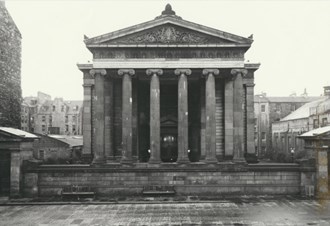
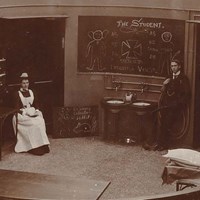 Wellcome Trust Research Bursaries
Wellcome Trust Research Bursaries
![cyril-dobie-2[3].jpg cyril-dobie-2[3].jpg](https://library.rcsed.ac.uk/media/1147/cyril-dobie-2-3.jpg?crop=0.1296998307226474,0,0.20558853682378461,0&cropmode=percentage&width=246&height=246)
